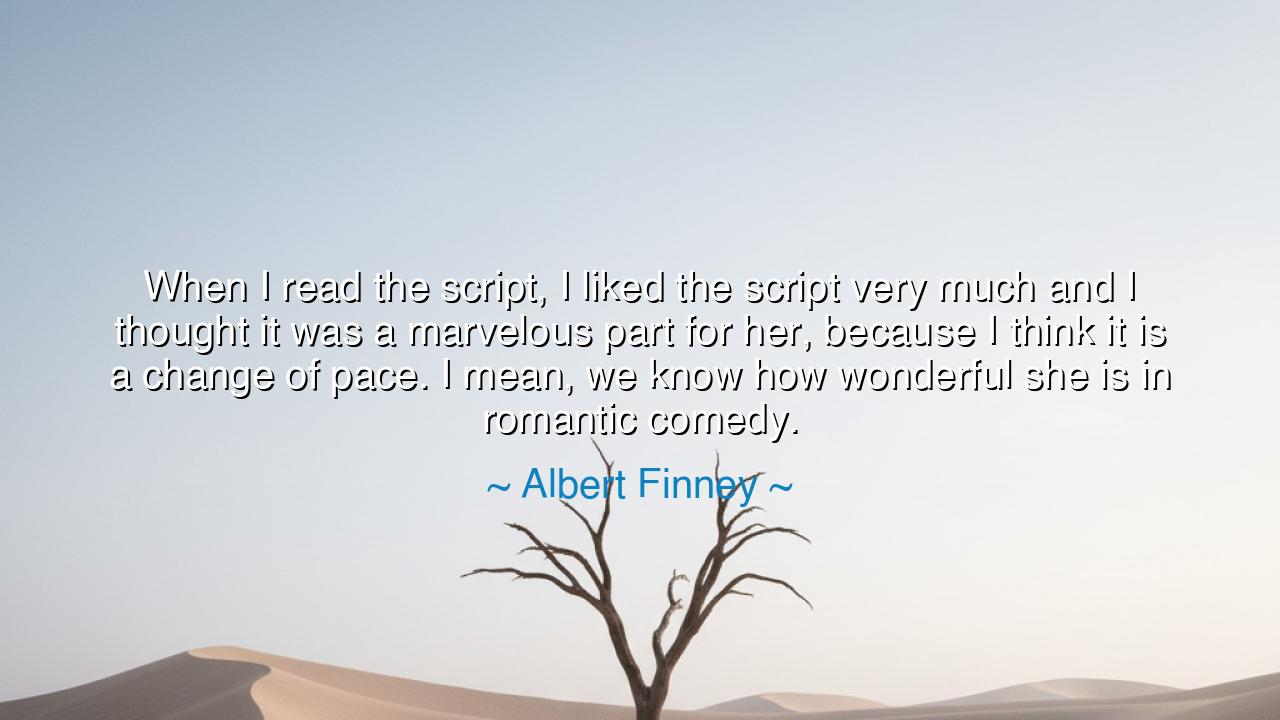
When I read the script, I liked the script very much and I
When I read the script, I liked the script very much and I thought it was a marvelous part for her, because I think it is a change of pace. I mean, we know how wonderful she is in romantic comedy.






Gather ye, children of time, and heed the wisdom of a man who, through his words, casts light upon the nature of growth, change, and the unexpected power of stepping beyond one's known self. The words of Albert Finney, spoken in reflection upon the talents of a great artist, resonate with eternal truth: “When I read the script, I liked the script very much and I thought it was a marvelous part for her, because I think it is a change of pace. I mean, we know how wonderful she is in romantic comedy.” These words, though seemingly simple, reflect the deeper currents of human potential—the need for evolution, the power of versatility, and the unforeseen heights that lie just beyond the horizon of the familiar.
In the world of art, and indeed in the world of life, we are often bound by the roles we play, the personas we create, and the familiar paths we tread. Romantic comedy, that enchanting dance of wit and love, is a realm where many have found their strength, their charm, and their recognition. She, of whom Finney speaks, has proven herself a master of this world. And yet, it is not the world of romantic comedy alone that defines the soul, for there are vast, uncharted waters beyond the familiar shores of comfort. The genius of Finney's words lies in his recognition of the power of change—the power of a new challenge, a shift in direction that can reveal depths unknown.
Consider, if you will, the tale of Leonardo da Vinci, that master of art and invention. While his name is forever associated with the sublime grace of the Mona Lisa, and the quiet mystery of The Last Supper, it is his restless pursuit of variety that defines him. Da Vinci, though renowned for his art, was not content with the mastery of one craft alone. He sought the change of pace that would come from invention, from science, from the very study of human anatomy and the laws of nature. His mind was never satisfied with the simple pleasures of familiarity; it yearned for the unfamiliar, the unknown, and in this relentless pursuit, his legacy is eternal.
In the arts, as in life, we find our greatness not in repetition but in reinvention. Just as the mighty rivers carve new paths through the earth, so too must we carve new paths for ourselves. The romantic comedy, though sweet and beloved, is but one path through the forest of possibility. There is much to be learned from stepping into the unknown, from exploring parts of the self that have yet to be discovered. Just as the finest actors rise above their roles, so too must we rise above the limitations we place upon ourselves. What are you capable of, O children of the earth, when you step beyond what is known? What greatness lies beyond the comfort of the roles you have already mastered?
In this light, Finney’s recognition of a new role for a great artist serves as a reminder to us all. We are often bound by the roles others place upon us, by the expectations of those who see only a fraction of our true potential. But true greatness lies in the courage to evolve, in the willingness to embrace new challenges, and to step into roles that are unfamiliar, uncomfortable, and perhaps even daunting. It is in these roles that we reveal our true mettle, our depth, and our versatility. And when we do so, we are no longer limited by the boundaries of our past successes, but are free to create anew.
Let us also turn to the tale of Mahatma Gandhi, whose life embodied this very principle. Gandhi, though beloved for his peaceful resistance and his leadership in the struggle for India's independence, was not simply a man of one idea. He evolved, from a lawyer in South Africa to a political leader in India. His tactics shifted, his strategies grew, and his message deepened. He was not merely a figurehead of one cause; he was a figure of transformation, constantly adapting to the needs of the moment, always seeking the change of pace that would bring true freedom to his people.
The lesson, my children, is this: If you find yourself trapped in the cycle of repetition, be not afraid to seek the unfamiliar, to embrace the challenge that lies beyond the easy victories. Do not let the world define you by the roles you have played, but instead define yourself by the roles you are willing to step into, by the challenges you are willing to accept. Let your life be marked not by the comfort of routine, but by the courage to change, to grow, and to evolve.
And so, in the words of Albert Finney, let us seek that change of pace, for in the new and the unknown we find our deepest selves. Take action, step beyond the roles you have known, and embrace the challenge that awaits. Only in this will you truly realize the fullness of your potential, as the greatest artists and leaders have done throughout history.






AAdministratorAdministrator
Welcome, honored guests. Please leave a comment, we will respond soon